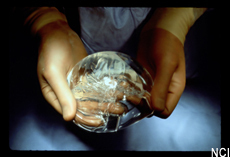by
Barbara Kram, Editor | November 24, 2008

Breast reconstruction
can affect radiation therapy
and vice versa
Fairfax, VA - For breast cancer patients who underwent a mastectomy who undergo radiation therapy after immediate breast reconstruction, autologous tissue reconstruction provides fewer long-term complications and better cosmetic results than tissue expander and implant reconstruction, according to a study in the November issue of the International Journal of Radiation Oncology-Biology-Physics, the official journal of the American Society for Therapeutic Radiology and Oncology.
After undergoing a mastectomy (surgical removal of the breast), many women choose to have a breast reconstruction procedure performed immediately to better cope with the psychological and aesthetic side effects of the surgery. However, the reconstruction can complicate radiation therapy treatments and sometimes radiation can negatively affect the outcome of reconstruction and increase the risk of long-term complications.
With radiation therapy increasingly becoming the standard of care for high-risk breast cancer patients after mastectomy, this can cause a problem for both patients and their radiation oncologists.



Ad Statistics
Times Displayed: 49670
Times Visited: 1409 Ampronix, a Top Master Distributor for Sony Medical, provides Sales, Service & Exchanges for Sony Surgical Displays, Printers, & More. Rely on Us for Expert Support Tailored to Your Needs. Email info@ampronix.com or Call 949-273-8000 for Premier Pricing.
Researchers at the Department of Radiation Oncology at Long Island Radiation Therapy in Garden City, N.Y., the Department of Surgery at Long Island Jewish Hospital in New Hyde Park, N.Y., the Department of Surgery at North Shore University Hospital in Manhasset, N.Y., and the Department of Surgery at Winthrop University Hospital in Mineola, N.Y., sought to determine if the type of reconstruction performed on women who were receiving radiation after a mastectomy had an impact on their long-term outcomes.
Two types of reconstruction are available for patients undergoing mastectomy for breast cancer: ATR (autologous tissue reconstruction), which involves the placement of a tissue flap - most commonly from the transverse rectus abdominus muscle - as a breast mound, and TE/I (tissue expander and implant reconstruction), which involves placing an inflatable tissue expander over the chest wall and exchanging it for a permanent implant at a later date.
This study involved the largest reported series of patients who sequentially underwent mastectomy, immediate reconstruction and postmastectomy radiation therapy. Ninety-two patients were observed for 38 months following their reconstruction and radiation treatments, and researchers found that ATR is better tolerated by breast cancer patients because it is associated with fewer long-term complications and better cosmetic results than TE/I.

